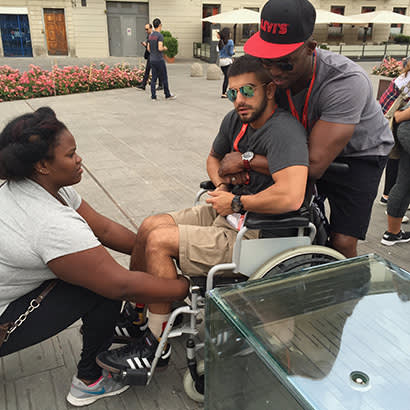
Study abroad program focuses on people with disabilities
Attitudes people without disabilities develop toward people with disabilities occur as a result of shared interactions, according to an article in the NASPA Journal. A study published in Therapeutic Recreation Journal examined whether disability simulation activities changed attitudes and fostered empathy toward people with disabilities. “Attitude Changes Following Participation in Disability Simulation Activities” examined 10 participants — comprised of males and females, ages 20 to 30 — who participated in an inclusive, recreation services, study abroad program.
Social Model of Disability
This study was grounded in the social model of disability, a model that centers on the argument that limitations are a result of a lack of accommodations provided by society. Participants experienced physical and emotional challenges while accessing transportation, restaurants and other sites. The model helped shift participants’ focus from seeing disability as a private experience to examining their role in increasing accessibility.
Mixed-Methods Approach
The researchers employed a three-phase, mixed-methods research design that used transformative procedures. The Attitudes Toward Disabled Persons (ATDP) scale and the Multidimensional Attitudes Scale Toward Persons with Disabilities (MAS) scale were administered at the beginning and end of the study. Disability simulation activities, debriefings and observations occurred abroad during the second phase. The third phase consisted of qualitative interviews followed by an in-depth thematic analysis of responses.
Disability Simulation Activities
Disability simulation activities allow participants to better understand and to address barriers encountered by people with disabilities. Participants experienced positive attitude changes. Qualitative results revealed that the participants transitioned from a sympathetic response to an empathetic response to an advocacy response. Four primary themes (sympathetic, empathetic, advocacy and culminating responses) and one secondary theme (socioemotional skill development) emerged.
Sympathetic Responses were demonstrated when participants voiced feelings of frustration, anger and sympathy when participating in and reflecting on initial activities. One student explains how prior to the simulations she “would feel a sort of pity towards people with disabilities” because she could do things they couldn’t, but after participating in the activities, she realized it does not have to be this way in many circumstances.
Empathetic Responses started to emerge during the second interviews. One student says, “Everyone should be able to experience the same things. As we did both activities, I found that my emotions have really evolved….I don’t feel pity, I feel more empathy for people with disabilities.”
Advocacy Responses emerged during the final debriefings and interviews. One student wonders how she could “make this world more inclusive, so that we may all have the opportunity to enjoy everything equally.”
Culminating Reactions were evident in participants’ comments reflecting on the entire experience. A student says, “People live different lives than we do, and being in the wheelchair really allowed me to experience life in a whole new way.”
Socioemotional Skill Development emerged when participants expressed how they built other skills, including communicate and show patience.
Creating a Fully Accessible Society
Short-term disability simulation experiences can cause participants to focus on difficulties, become frustrated and sympathetic, and believe people with disabilities lack the ability to live independently. But the challenges and intensive debriefings in this study helped participants’ feelings evolve from sympathy to advocacy. The disability simulation activities helped them understand and accept their role in creating a fully accessible society.
Alexis McKenney Ed.D., CTRS, is a Professor and Recreational Therapy Program Director at Temple University.

